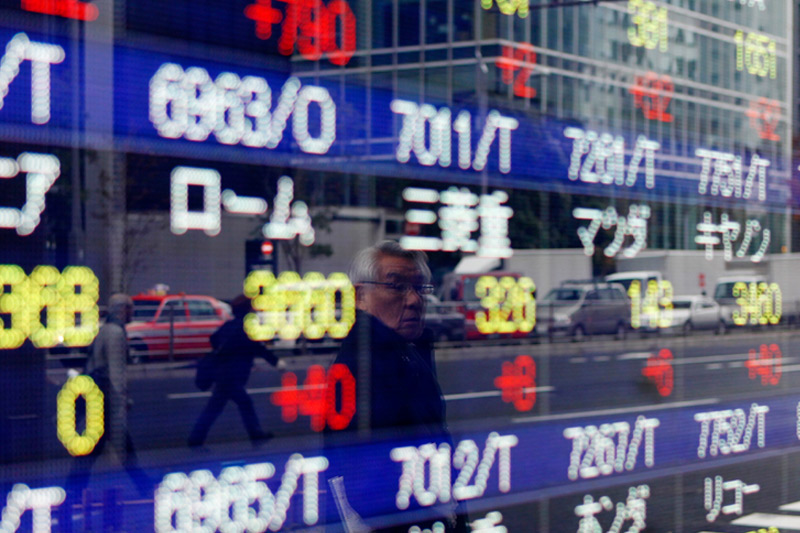Investing.com - Asian stocks were mixed Friday as investors mulled the fate of the Federal Reserve’s quantitative easing program and following key data out of China.
In Asian trading Friday, Japan’s Nikkei 225 slipped 1.09%. Japanese stocks came under pressure after electronics giant Sony slid by double-digits after paring its full-year profit forecast by 40%. Rival Panasonic actually traded higher, but the broader Topix was down 0.80%.
Hong Kong’s Hang Seng inched down 0.06% while the Shanghai Composite rose 0.12% after China’s National Bureau of Statistics said the country’s PMI was 51.4 in October, beating the consensus estimate of 51.2 and the September reading of 51.1.
The preliminary reading of a manufacturing purchasing managers’ index from HSBC Holdings and Markit Economics released Oct. 24 was a higher-than-estimated 50.9, according to Bloomberg. Readings above 50 indicate expansion.
The new orders index rose to 51.3 from an initial reading of 50.8. Domestic new orders also surged, a positive sign for the world’s second-largest economy, which is trying to transition to more domestic consumption away from a dependence on exports.
Australia’s S&P/ASX 200 Index fell 0.1% after the Australian Bureau of Statistics said that country’s producer price inflation was 1.3% in the third quarter after checking in at just 0.1% in the second quarter. Analysts expected a third-quarter reading of 0.7%.
New Zealand’s NZSE 50 nudged up 0.07%. In U.S. economic news out Thursday, the Chicago manufacturing purchasing managers’ index jumped to 65.9 in October from 55.7 in September. Analysts had expected the index to decline to 55.0.
The new orders component of the index jumped to a nine-year high of 74.3 from 58.9 in September.
Meanwhile, the Department of Labor said the number of individuals filing for initial jobless benefits in the week ending October 25 declined by 10,000 to a seasonally adjusted 340,000, in line with market expectations. The U.S. is the world’s largest oil consumer.
South Korea’s Kospi rose 0.26% after the Korea National Statistical Office said that South Korean consumer price inflation fell to negative 0.3% last month from 0.2% in September. Analysts expected an October reading of 0.1%.
Separately, the statistics office said South Korea’s trade surplus advanced to USD4.89 billion last month, topping estimates of USD4.32 billion. Exports rose 7.3% to USD50.51 billion while imports gained 6.1% to USD45.61 billion.
Singapore’s Straits Times Index fell 0.44% while S&P 500 rose 0.07%.
In Asian trading Friday, Japan’s Nikkei 225 slipped 1.09%. Japanese stocks came under pressure after electronics giant Sony slid by double-digits after paring its full-year profit forecast by 40%. Rival Panasonic actually traded higher, but the broader Topix was down 0.80%.
Hong Kong’s Hang Seng inched down 0.06% while the Shanghai Composite rose 0.12% after China’s National Bureau of Statistics said the country’s PMI was 51.4 in October, beating the consensus estimate of 51.2 and the September reading of 51.1.
The preliminary reading of a manufacturing purchasing managers’ index from HSBC Holdings and Markit Economics released Oct. 24 was a higher-than-estimated 50.9, according to Bloomberg. Readings above 50 indicate expansion.
The new orders index rose to 51.3 from an initial reading of 50.8. Domestic new orders also surged, a positive sign for the world’s second-largest economy, which is trying to transition to more domestic consumption away from a dependence on exports.
Australia’s S&P/ASX 200 Index fell 0.1% after the Australian Bureau of Statistics said that country’s producer price inflation was 1.3% in the third quarter after checking in at just 0.1% in the second quarter. Analysts expected a third-quarter reading of 0.7%.
New Zealand’s NZSE 50 nudged up 0.07%. In U.S. economic news out Thursday, the Chicago manufacturing purchasing managers’ index jumped to 65.9 in October from 55.7 in September. Analysts had expected the index to decline to 55.0.
The new orders component of the index jumped to a nine-year high of 74.3 from 58.9 in September.
Meanwhile, the Department of Labor said the number of individuals filing for initial jobless benefits in the week ending October 25 declined by 10,000 to a seasonally adjusted 340,000, in line with market expectations. The U.S. is the world’s largest oil consumer.
South Korea’s Kospi rose 0.26% after the Korea National Statistical Office said that South Korean consumer price inflation fell to negative 0.3% last month from 0.2% in September. Analysts expected an October reading of 0.1%.
Separately, the statistics office said South Korea’s trade surplus advanced to USD4.89 billion last month, topping estimates of USD4.32 billion. Exports rose 7.3% to USD50.51 billion while imports gained 6.1% to USD45.61 billion.
Singapore’s Straits Times Index fell 0.44% while S&P 500 rose 0.07%.
